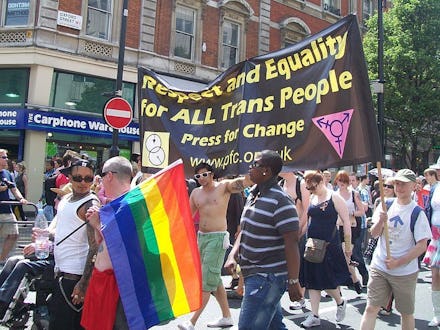Our Generation's Media Will Smash Gender Stereotypes

Editor's note: This piece is part of PolicyMic's series in honor of Transgender Day of Remembrance 2013, addressing issues of trans visibility and the media.
As a genderqueer person who spends too many hours reading the news, it no longer fazes me when journalists fail to use the correct pronouns and name for a trans* person. Whether it's a news article or television show, mass media representation of trans individuals relies heavily on the sensationalization of the person’s body, or on alignment of the person’s gender identity with outdated stereotypes — because if you like wearing dresses, then surely you must be a girl. I'm tired of these kinds of stories, which do not respect or value trans people.
Too often my family and friends ask me invasive questions or force labels on me. Do you plan on having surgery? What was your birth name? So, are you straight now? These questions typically come from a place of genuine curiosity. I want to help the person understand my experience, but I also cringe when I hear such questions. I am exhausted with my role as educator and afraid that my answers will be interpreted as the universal experience of all trans people.
The popular entitlement to hearing stories of trans people’s bodies which I myself have experienced is reflected in (or even originates from) practices set by the media. Questions no one would ask in any other circumstance somehow get dropped in casual and formal conversations.
Let’s be real: We consume a lot of media, and that consumption has an effect on how we process information. Most people do not know much about the realities of the trans community, or even know a trans person, and thus they depend on nformation relayed from media outlets.
The media might be the gatekeeper to information, but luckily young people have the power to change the media landscape.
Our generation is challenging the gender binary and redefining gender roles. While many of my friends and peers do not identity as trans, I see them questioning what they have been told about their gender identity and expression. They are tired of sexist tropes and ridiculous standards. Still, I do not think my peers have yet realized that inaccurate or distorted trans narratives damage everyone’s ability to explore constructions of gender.
Coalitions of trans and cis people working together to create responsible media are still limited, but certain communities have begun to reclaim their stories on a mass scale. The failure to present nuanced histories of trans people has created a vacuum for youth-led reporting and storytelling. Our tech-savviness and drive to create alternative media for trans people, by trans people, has manifested all over the internet. We have created transition guides, cultural magazines, media watchdog organizations, one of the largest YouTube platforms for discussion, and on and on.
Our community has launched resources to educate ourselves and connect with others, but we still need mainstream media to get on board. If I mention an article from Original Plumbing or Janet Mock’s website, most people will have no idea what I am saying.
READ MORE: "16 Beautiful Portraits Of Humans Who Happen to Be Trans"
Now, our challenge and responsibility is to make this kind of content accessible to everyone, and to include cis folk who are also eager to disrupt the gender binary.
There are many approaches we can take to reclaim the media to present more complex narratives of trans individuals. We can work with established outlets and hold them accountable for unethical journalism, as seen by the Associated Press’s decision to honor Chelsea Manning’s gender identity. Alternatively, we can find ways to circulate existing content created by trans communities to larger audiences, giving us the power to promote the narratives we choose.
Either way, our media revolution has begun. Our generation is ready to broadcast our values to those who will listen.
Author's note: *In this piece I use trans as an umbrella term encompassing transsexual and transgender folk, gender-non-conforming and -variant individuals, and all others whose gender identity, expression, and/or assignment are fluid.